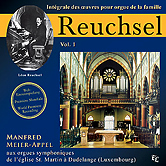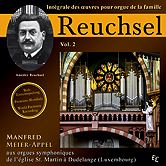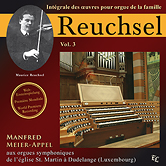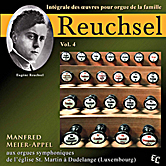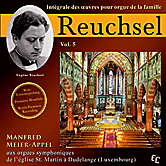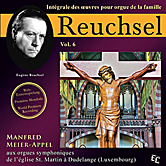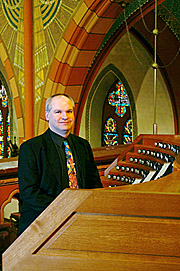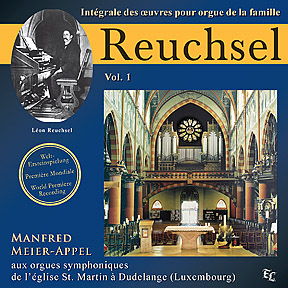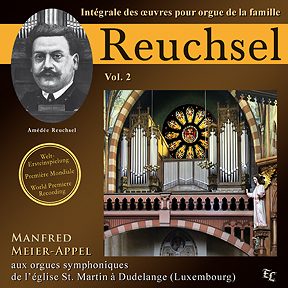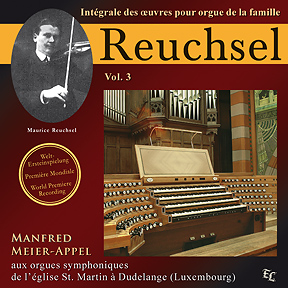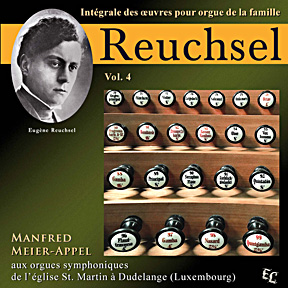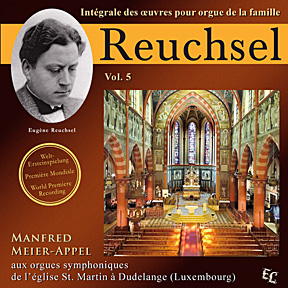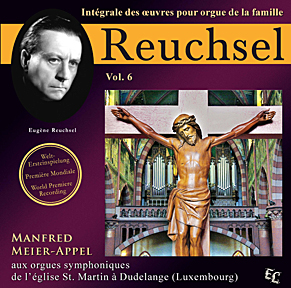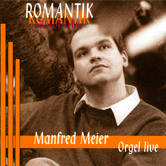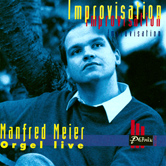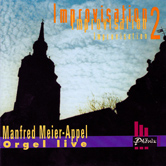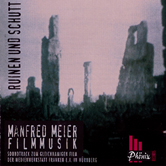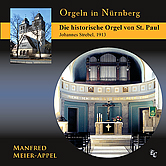The Complete Organ Works of
Léon, Amédée, Maurice and Eugène REUCHSEL
Manfred Meier-Appel
St. Martin, Dudelange (Luxemburg)
A customer spontaneously wrote upon hearing Volume 1 for the first time:
“The result speaks for itself. A great experience in sound and truly beautiful music!
I can hardly wait for the next Reuchsel CDs!! Many thanks to the artist Manfred Meier-Appel
who joined you on the way to recording these superb works which were scarcely known to me. I am
beside myself!!! And the organ seems to have been built expressly to perform this music!”
Reflecting on the family named Reuchsel that dominated the musical life of Lyon for more than a century, speaking of a dynasty comes naturally. The members of this family were not only church organists, but committed pedagogues who maintained regular contacts with well-known personalities of their times.
The first musician in the family was Johann Reuchsel or "Reuschel," born March 28, 1791, in Germany in Bettenhausen by Schmalkalden-Meiningen (Thuringia). He was possibly a decedent of Johann Georg Reuschel, mentioned in the Biographie universelle of François-Joseph Fétis. Johann Georg Reuschel was a cantor in Annaberg (Upper Silesia) and 1667 in Markersbach (Erzgebirge).
Johann Reuchsel was music director at the Royal Theater in Würzburg/Germany and subsequently moved to Burgundy where he married Marie-Anna Poinet in 1825 with whom he had seven children: Félix (1826-1827) who died in infancy, the pianist and poet Louise-Mélanie (1828-1860?), the piano, violin and harmony teacher Felix (1830-1917), the cellist Jean (1833-1876), the organist, music teacher, author of a piano and voice method and a publication on music theory Ernest (1838-1914), the organist, composer and conductor Léon (1840-1915) as well as the piano builder and music publisher Joseph-Maurice (1848-1917).
When his son Félix became violinist at the Lyon Grand Théâtre, father Johann (Jean) Reuchsel also moved to Lyon in 1852 where he was appointed music instructor at the Chartreux Institution and in 1867 organist of Saint-Georges.
Jean Reuchsel died on March 15, 1871 in Lyon. He was the author of a study in Theoretical, Analytical and Practical Music Harmony and composer of masses and string quartets that have unfortunately been lost.
Léon Reuchsel (Collection Günter Lade)
Léon Reuchsel, 1840-1915
Léon Reuchsel was born February 11, 1840, in Vesoul and received his musical education first from his father and later in Paris as student of the organist of Saint-Eustache, Edouard Batiste. He returned to Lyon until his death in August, 11, 1915, where he served as organist, first from 1859 to 1861 at the organ of Saint-Paul followed by a position at Saint-Bonaventure where his fifty-year anniversary of service was celebrated with an imposing festival on January 15, 1911.
Léon had two sons Amédée und Maurice, born 1875 and 1880, with his wife Marie-Félicité Dieu of Dijon. The sons continued the musical heritage of the family.
With the Secretary General of the Academy of Sciences, a mathematician at the Lyoner Lycée Ampère and musical enthusiast Joseph Bonnel, Léon Reuchsel founded and directed the Lyon choir society La Lyre Sacrée. The Société Sainte-Cécile was also reorganized by these two artists in 1880 and was responsible for the performances of important works of composers such as Jules Massenet, Hector Berlioz and César Franck. As chronicled by Maurice, in 1889 his father conducted the Messe Solennelle by César Franck, who played the organ part himself and greatly enhanced the concert with "quite remarkable improvisations." Also included among the scores of performing artists was Théodore Dubois, who played the organ part of his Sept Paroles du Christ under the direction of Léon Reuchsel in 1893.
Léon Reuchsel maintained contacts with other major artists of the times. Guilmant writes to him on January 3, 1909: "…I thank you for the excellent article that you wrote about my performance in the Salle Rameau. I was very pleased with the enthusiastic reception of the people of Lyon…" And in 1881 Franz Liszt writes: "I am very grateful for the honor of your invitation, which I regrettably cannot accept. From the middle of September until January 1 will be ensconced in the Villa d’Este after which I shall return as quickly as possible to my commitments in Budapest…"
Reuchsel often performed at organ dedication ceremonies. In 1880 he was the author of a study on "the significance of melody, rhythm and harmony in the music of all European peoples from the Middle Ages to the present." Under the pseudonym Pierre Heller he turned to poetry and in 1915 published Cinq poèmes d’actualité containing passionate and eloquent verses directed against the war opponent of the times, the Germans.
The highly esteemed musician left behind more than one hundred works for piano, various organ compositions, motets as well as songs for baritone with organ accompaniment, a cantata, works for choir and orchestra, eight masses (one with orchestra accompaniment), a sonata for violin and piano, two lyrical dramas and a comic opera. He was also interested in instrument building, especially of organs. In 1913 he was the professional consultant for the restauration of the organ in the Lyon synagogue. He repeatedly applied for patents for his inventions. In March of 1878 he applied for a patent for a sonograph which could record music played on a keyboard; in 1881 and 1886 he applied for a patent on an organophone which was intended to aid in the study of organ performance.
Amédée Reuchsel (Collection Marcel Degrutère)
Amédée Reuchsel, 1875-1931
Amédée, the first son of Léon Reuchsel, was born March 21, 1875. After initial home instruction and attendance at the Lycée Ampère in Lyon he studied at the Royal Conservatory of Music in Brussels where he was the student of the professors Dupont, Mailly and Tinel. He completed his studies in organ, harmony, and composition with first prizes. Amédée Reuchsel was also a student of Gabriel Fauré in Paris and after his return to Lyon he successfully won a competition to become organist of the Grand Temple as well as organist of the Lycée Ampère chapel.
In 1911 he left Lyon and moved to Paris where he assumed the position of organist at the church Saint-Denis-du-Saint-Sacrement, the same church where Louis Vierne’s uncle Charles Colin had been organist from 1869 to 1881.
The well-known musician successfully dedicated his life to composition. He composed three sonatas and several concert pieces for organ, choir music, songs for voice with piano, organ or orchestra accompaniment, orchestral works, especially popular chamber music (for which he was awarded the Prix Chartier of the Institut de France), as well as an oratorio, a lyrical drama, a comic opera and a ballet - music which is today only waiting to be rediscovered. The publisher Dupuis printed various theoretical works of the artist who died July 10, 1931, in Montereau.
Maurice Reuchsel (Collection Reuchsel)
Maurice Reuchsel, 1880-1968
Maurice, the second son of Léon Reuchsel, born November 22, 1880 in Lyon, showed remarkable talent for music, especially for the violin. He completed studies in violin at the Paris Conservatory after which he returned to Lyon. There he occasionally substituted for his father on the Saint-Bonaventure organ followed by 10 years as organist at the Bon Pasteur parish. Finally he was titular organist on the great Merklin organ in the La Rédemption parish church.
In 1900 Maurice and Amédée Reuchsel initiated a concert series for old and new chamber music and in 1903 the Société Lyonnaise des instruments anciens. Noteworthy is the founding in 1903 of the publication Express musical which appeared biweekly as a supplement to the Express Républicain until 1914. The Express musical contained extensive, often six-page features as well as current information about the regional and national music scene supplemented by a foldout containing a musical composition. Maurice was founder and editor-in-chief, but with contributions, critiques, and compositions from Léon and Amédée in fact all members of the family were involved in the production of this publication.
Maurice Reuchsel died on July 12, 1968 in Lyon leaving behind numerous compositions, among them his Prélude de Cymodocée, premiered in 1932 at the Concerts Colonne under the baton of Gabriel Pierné, pieces for violin with piano and orchestra accompaniment, various organ works as well as ballet music.
As virtuoso violist Maurice Reuchsel disposed of a rich repertory of French compositions which he published in his own transcriptions and settings for viola. Furthermore many of his theory analyses appeared in print.
Eugène Reuchsel (©: Claire Aniotz-Schlee)
Eugène Reuchsel, 1900-1988
Eugène Reuchsel was a well-known concert pianist who traveled the world. He was born July 21, 1900 in Lyon as the son of Amédée Reuchsel. Eugène was close to his grandfather Léon who gave him piano lessons as of age three and mentored him musically until his acceptance into the Paris Conservatory. His grandfather was a venerated figure throughout his life.
As a student of Edouard Risler und Francis Planté, Eugène received not only a Premier Prix de Piano by unanimous decree already at the age of sixteen, he was awarded the seldom granted Prix d’excellence of the Paris Conservatory. The close association with the Italian pianist, composer and pedagogue Ferrucio Busoni had great influence on the Chopin and Liszt interpretations of the young artist for whom it was important to perform for decentralization and artistic propaganda. In the course of his lifetime Eugène Reuchsel performed some 5500 concerts, not only in France but in foreign lands near and far. His musical journeys abroad led him for instance to North Africa, to the capital of Senegal on the North African Atlantic coast, to the land-locked African country of Chad, and to the East African Republic of Djibouti.
Eugène Reuchsel was also a composer of piano music and wrote among others Bourrées sur des airs populaires français [Dances based on French folksongs] - Une Esquisse d’un thème à développer [Sketches on the development of a theme] - La Marseillaise - Pièces symphoniques pour deux pianos [Symphonic pieces for two pianos]. He composed settings for the folksongs of French provinces and was the publisher of piano compositions by Liszt. Eugène Reuchsel also wrote Une heure d'exercices par Eugène Reuchsel [An hour of practice by Eugène Reuchsel] as well as large organ cycles.
The last important representative of the Reuchsel dynasty died on September 22, 1988 in Pollionnay near Lyon.
Pierre-Marie & Michelle Guéritey
Abridged version of: Les Orgues de Lyon (Inventaire national des orgues), Editions Comp’Act, 1992,
printed with friendly consent of the authors, revised and updated by Günter Lade (2015).
The Music
Manfred Meier-Appel :Léon Reuchsel left behind no large works for organ. The pieces from 1912 should be considered practical liturgical accompaniment and can be performed on an harmonium or a small organ with manuals only. They are reminiscent of the collections L’Organiste by César Franck or of the 24 Pièces en style libre by Louis Vierne, although their brevity may belie the originality and formal quality of Reuchsel’s musical gems.
When Günter Lade drew my attention some years ago to the three large sonatas for organ by Amédée Reuchsel - and as I first played through them - I was overwhelmed by the degree of complex diversity in both formal and tonal aesthetic. I was aware of the works of his son Eugène, but of his father, grandfather and uncle? Only with great difficulty can one surmise what factors or events lead one composer to attain a high level of recognition whereas other equally competent composers are relegated to obscurity. In the case of Amédée Reuchsel, in addition to other factors, it was probably his position at the lesser known Saint-Denis-du-Saint-Sacrement church in Paris that did not have the status of the positions of Widor at Saint-Sulpice or Vierne at Notre-Dame. Amédée Reuchsel was active during the Musikalischer Jugendstil period, known as Art Nouveau in France. Progressive composers such as the Franck student Charles Tournemire, the Widor student Edgar Varèse (Amérique), the expressionists or modern individualists, cast a shadow on what appeared to be the an-tiquated form of sonata preferred by Guilmant. The monumental organ symphonies of Widor or Vierne, exploiting the orchestral timbres of the great Cavaillé-Coll organs, clearly had a greater impact. The music of Amédée Reuchsel was published during his lifetime, but almost all editions have been out of print for decades and some of the publishers no longer exist. The present recording therefore is intended to rediscover the person and his creative production and to revive the status of both.
The pieces for organ or harmonium by Maurice Reuchsel, Amédée’s younger brother, are of pure simplicity and aesthetic fulfillment. In the miniatures for ecclesiastical purposes there is a beauty of creative composition that leaves one wishing Maurice had composed more solo works for organ. The Adoration for exemple with its single-voiced and unpretentiously accompanied Adoremus in aeternum is reminiscent of the Lyrical Pieces of Edvard Grieg, both musically and formally. In Maurice’s Cantilène. Adagietto quietissimo, alla pastorale an entrancing oboe melody appears over an upbeat rhythmically supporting bass voice. The meditative, poetic character of this tune engenders an aura of enchantment.
How can the musical language of Eugène Reuchsel best be described? It is informed by a tonal harmony typical of the composers at the turn of the century. Neoimpressionist? If there ever was an impressionism, which I seriously question (whereby I am essentially of the same opinion as Claude Debussy), the term could easily be used to describe the colorfulness of the works by Eugène Reuchsel, especially in regard to the harmonic structures common to the art nouveau of the times. Numerous compositions from Liszt’s entourage could be defined as such and, after all, Eugène Reuchsel was a second generation disciple of Franz Liszt.
The individual recordings :
Vol. 1
EL CD 056
Please click on the image
for more information and ordering.
Amédée Reuchsel (1875-1931)
Dix nouvelles pièces
World Premiere Recording 1. Pastorale
World Premiere Recording 2. Allegro symphonique
World Premiere Recording 3. Méditation
World Premiere Recording 4. Fantaisie-Choral
World Premiere Recording 5. Berceuse de Noël
World Premiere Recording 6. Introduction et Canon
World Premiere Recording 7. Elégie
World Premiere Recording 8. Marche Triomphale
World Premiere Recording 9. Printemps
World Premiere Recording 10. ToccatinaLéon Reuchsel (1840-1915)
World Premiere Recording Entrée
World Premiere Recording Pastorale gothique
World Premiere Recording Offertoire
World Premiere Recording Communion
Introduction et Toccata canoniqueAmédée Reuchsel (1875-1931)
Sonate Nr. 1 en fa mineur (1910)
World Premiere Recording 1. Allegro Deciso
World Premiere Recording 2. Adagio Symphonique
World Premiere Recording 3. Toccata
Vol. 2
EL CD 057
Please click on the image
for more information and ordering.
Amédée Reuchsel (1875-1931)
Sonate Nr. 2 en mi mineur (1911)
World Premiere Recording 1. Allegro con Brio
World Premiere Recording 2. Interludium. Andante con moto
World Premiere Recording 3. Choral [Ein feste Burg ist unser Gott], Fugue et VariationMaurice Reuchsel (1880-1968)
World Premiere Recording Adoration
Amédée Reuchsel (1875-1931)
World Premiere Recording Prélude Gothique
World Premiere Recording Interlude en mi majeur
World Premiere Recording Fugue en la mineur
Postlude Festival
Maurice Reuchsel (1880-1968)World Premiere Recording Cantilène
Amédée Reuchsel (1875-1931)
Sonate Nr. 3 en sol majeur (1913)
World Premiere Recording 1. Prélude sur un thème liturgique [Asperges me]
World Premiere Recording 2. Pastorale
World Premiere Recording 3. Choral Varié (sur une ancienne Mélodie bretonne)
World Premiere Recording 4. Carillon Nuptial
Vol.3
EL CD 058
Please click on the image
for more information and ordering.
Maurice Reuchsel (1880-1968)
Trois Pièces (1909)
World Premiere Recording Prélude
World Premiere Recording Adagio
World Premiere Recording Final
Amédée Reuchsel (1875-1931)
Fragments d'oratorios (1903)
World Premiere Recording Bach : Air de la Passion selon St. Mathieu, N° 12 [ Transcription ]
World Premiere Recording Bach : Air de la Passion selon St. Mathieu, N° 48 [ Transcription ]
World Premiere Recording Bach : Chœur final de la Passion selon St. Mathieu [ Transcription ]
Maurice Reuchsel (1880-1968)
World Premiere Recording Marche religieuse
Amédée Reuchsel (1875-1931
Pièces d'Orgue (1899)
World Premiere Recording Prélude
World Premiere Recording Cantabile
World Premiere Recording Fantaisie
Carillon
World Premiere Recording Grand Chœur
Eugène Reuchsel (1900-1988)
Bouquet de France (1986/87)
1. Le pauvre Laboureur (version Bressanne)
2. Rossignolet du bois joli (version Bressanne)
3. La Fille aux Oranges (version Niçoise)
4. Le Retour du marin (version de l'Ouest)
5. Là-haut sur la Montagne (Pastourelle d' Alsace)
6. Douce merveille (Noël Strasbourgeois de 1697)
7. Voici le joli mois de Mai (version Dauphinoise)
8. Ma Mère m'envoie-t-au marché (version de l'Ouest)
9. Berceuse (du pays d'Auvergne)
10. V'là la Saint-Martin (version Bressanne)
Vol. 4
EL CD 059
Please click on the image
for more information and ordering.
Eugène Reuchsel (1900-1988)
Promenades en Provence (1938-1973)
1. Vieux Noëls Provençaux (Nuit de Noël à Saint-Tropez)
2. Les Grandes Orgues de la Basilique de Saint-Maximin
3. Tambourinaires sur la place des Vieux Salins
4. Nuages ensoleillés sur le Cap Nègre
5. Le Cloître de Saint-Trophime à Arles
6. Petit Cimetière ... de Bormes-les-Mimosas
7. Voiles multicolores au port de Toulon
8. Les Cloches de Notre-Dame des Doms en Avignon
9. Jour de fête aux Saintes-Maries de la Mer
10. Profil de la Porte d'Orange à Carpentras
11. Le Moulin d'Alphonse Daudet à Fontvieille
12. La Chartreuse de Montrieux au crépuscule
13. Visions à l'Abbaye de Sénanque: La Foi en Dieu – La Joie en Dieu
Vol. 5
EL CD 060 -
for the introductory price of € 15,90 (plus shipping and handling) available from March, 21th
Eugène Reuchsel (1900-1988)
Évocation de Louis Vierne (1979)
World Premiere Recording 1. La rosace ensoleillé ... au-dessus du Grand Orgue
2. Son âme d'artiste chante l'espoir de sa délivrance des ténèbres
World Premiere Recording 3. La lumière géniale luit dans ses yeux d'aveugleEugène Reuchsel (1900-1988)
Huit Images de Provence (1984)
1. Assauts de vagues aux rochers de l'lle de Port-Cros
World Premiere Recording 2. Balancements des barcasses ... au Vieux Port de Saint-Tropez
World Premiere Recording 3. Hallucinante évocation des Moines ... de la Chartreuse de la Verne
4. L'Etoile Radieuse de Moustiers Sainte-Marie
World Premiere Recording 5. Humble petit oratoire à l'ombre d'oliviers séculaires
6. Coucher de Soleil sur les ... Tours du Château de Lourmann
7. Douceur des Champs de Lavande fleurie
8. Coup de Mistral en Garrigue ProvencaleEugène Reuchsel (1900-1988)
Six Pièces de Concert, en hommage à la mémoire d'Aristide Cavaillé-Coll (1985/86)
World Premiere Recording 1. Prélude en style fugué double
World Premiere Recording 2. Intermède (Obsession d'un thème)
World Premiere Recording 3. Quiétude et Espérance
World Premiere Recording 4. Joies et Enthousiasmes
5. Recueillement et Béatitude
6. Final en style Toccata
Vol. 6
EL CD 061 -
for the introductory price of € 15,90 (plus shipping and handling) available from March, 21th
Amédée Reuchsel (1875-1931)
Fragments d'oratorios (1903)
World Premiere Recording Händel : Ouverture du Messie [ Transcription ]
World Premiere Recording Händel : Air du Messie, N° 9 [ Transcription ]
World Premiere Recording Händel : Chœur du Messie, N° 22 [ Transcription ]
World Premiere Recording Händel : Fugue Chorale du Messie, N° 25 [ Transcription ]
World Premiere Recording Händel : Air de Soprano du Messie, N° 32 [ Transcription ]Amédée Reuchsel (1875-1931)
Fragments d'oratorios (1903)
World Premiere Recording Mendelssohn-Bartholdy : Air d'Elie, N° 14 [ Transcription ]
Eugène Reuchsel (1900-1988)
La Vie du Christ: Evocations d'après l'Evangile de Saint Luc (1987)
World Premiere Recording 1. L'Annonciation (Luc 1, 31)
World Premiere Recording 2. La Nativité (Luc 2, 6-7)
World Premiere Recording 3. Le Baptême (Luc 3, 21-22)
World Premiere Recording 4. La Prophétie accomplie (Luc 4, 20-21)
World Premiere Recording 5. Les Béatitudes (Luc 6, 20)
World Premiere Recording 6. La Pécheresse pardonnée (Luc 7, 47 et 50)
World Premiere Recording 7. La Tempête apaisée (Luc 8, 24-25)
World Premiere Recording 8. La Multiplication des Pains (Luc 9, 16-17)
World Premiere Recording 9. La Transfiguration (Luc 9, 32 et 35)
World Premiere Recording 10. La Parabole de la lumière (Luc 11, 33 et 36)
World Premiere Recording 11. La Grâce de Dieu (Luc 17, 21)
World Premiere Recording 12. Les Enfants jouent près de Jésus (Luc 18, 16-17)
World Premiere Recording 13. L'Aveugle (Luc 18, 35-42)
World Premiere Recording 14. L'Entrée à Jérusalem (Luc 19, 37-38)
World Premiere Recording 15. La Cène (Luc 22, 19)
World Premiere Recording 16. Le Crucifiement (Luc 23, 33)
World Premiere Recording 17. La Résurrection (Luc 24, 5-6)
World Premiere Recording 18. La Promenade à Emmaüs (Luc 24, 30-31)
World Premiere Recording 19. L'Ascension (Luc 24, 50-51)World Premiere Recording 1. version : 8. La Multiplication des Pains (Luc 9, 16-17)
World Premiere Recording 1. version : 12. Les Enfants jouent près de Jésus (Luc 18, 16-17)
other recordings with Manfred Meier-Appel :
subject to change
